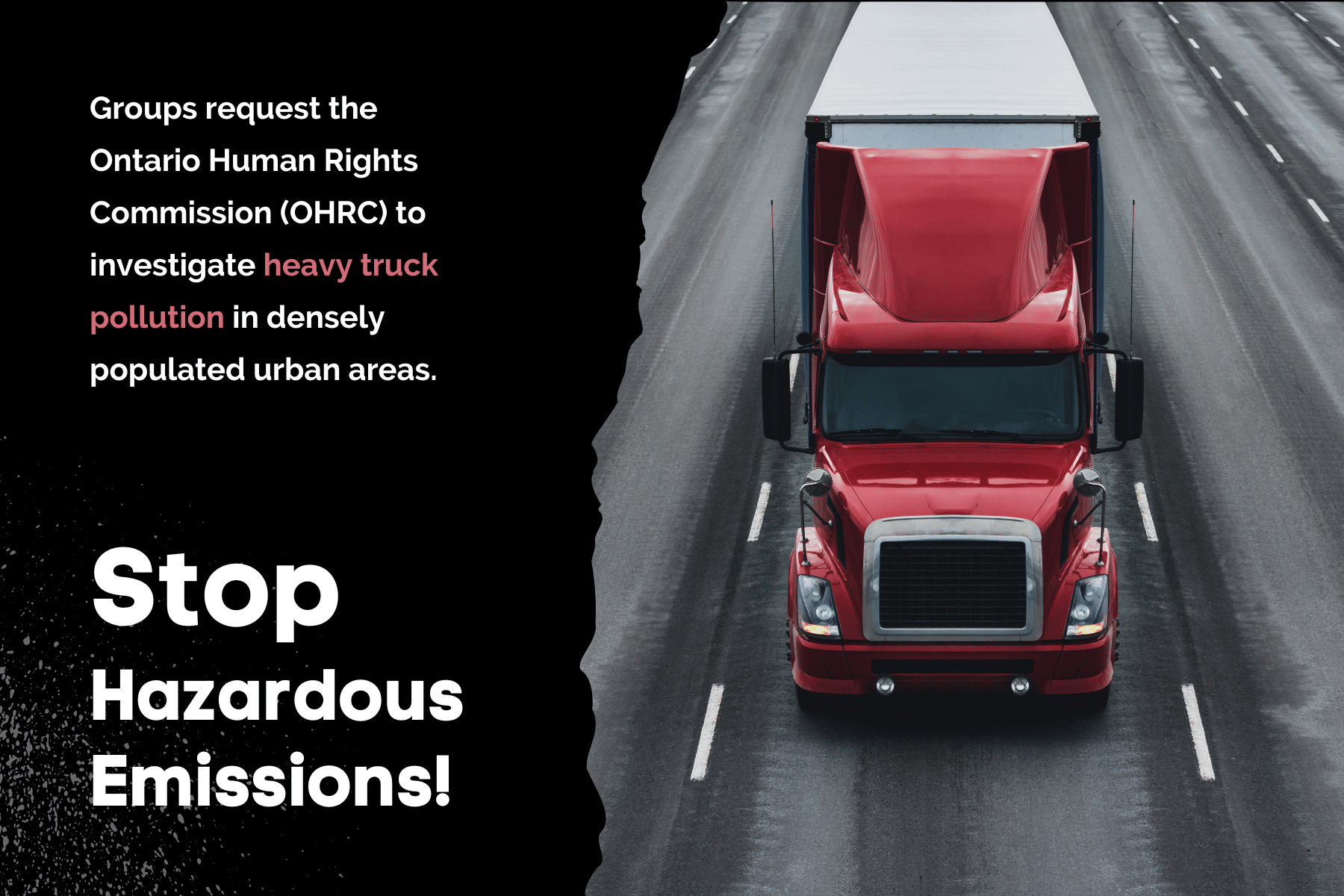
A Call for OHRC to Investigate Ottawa’s Heavy Truck Pollution
This article is adapted from a press release originally issued by Ecojustice titled: “Groups request human rights investigation into heavy truck routing in downtown Ottawa“
Groups call on Ontario Human Rights Commission to investigate health impacts posed by route
OTTAWA/TRADITIONAL, UNCEDED TERRITORY OF THE ALGONQUIN ANISHNAABEG PEOPLE — Health, community, and environmental groups are calling on the Ontario Human Rights Commission (OHRC) to investigate the City of Ottawa’s ongoing practice of routing heavy trucks through the City’s densely populated downtown core. The move is part of ongoing efforts to address the urgent health threat posed by heavy truck emissions along the route and comes more than a year after an open letter to Ottawa Mayor Mark Sutcliffe, which has to date gone unanswered.
The groups seeking the investigation include Ecojustice, Canadian Association of Physicians for the Environment, Friends of the Earth Canada, Action Sandy Hill, and the Lowertown Community Association.
Air pollution is recognized globally as a major health risk — it is estimated that it causes approximately 6,700 premature deaths in Ontario every year. Diesel emissions from heavy trucks, like those along Ottawa’s trucking corridor, are considered the most hazardous pollution of vehicle emissions and pose serious risks to those within 50-250 metres of the roadway.
Heavy truck pollution in Ottawa’s downtown core has been an ongoing issue since the mid-1960s. Ottawa’s trucking by-law permits heavy trucks to roll through a densely populated neighbourhood that is home to thousands of residents, hundreds of local businesses, a daycare centre with an outdoor play area just metres from the roadway, and three homeless shelters where people congregate at street level for hours every day (resulting in prolonged exposure to truck pollution).
By allowing heavy trucks to be routed through the downtown core, and disproportionately impact vulnerable communities, the City of Ottawa is in violation of the Ontario Human Rights Code. An inquiry by the Ontario Human Rights Commission would allow for the development of human rights-based solutions and could compel action from the City, and potentially the Province of Ontario, to address the discriminatory impacts of truck pollution in Ottawa.
Bronwyn Roe, lawyer, Ecojustice said:
“Last summer, Ottawa was blanketed with wildfire smoke that caused days of severe air quality warnings. But for those who live and work along Ottawa’s downtown trucking route, dangerous air pollution is an everyday lived reality. Heavy emissions from the trucking route have posed unacceptable health risks to some of the most vulnerable in our community for decades. It’s time the City of Ottawa cleaned up its act.”
Beatrice Olivastri, CEO, Friends of the Earth Canada said:
“The United Nations General Assembly has recognized that everyone has a right to a healthy environment, including clean air, water, and a stable climate. Air pollution is recognized locally to globally as a major health risk. Since Mayor Sutcliffe has ignored our open letter, we’re calling on the Ontario Human Rights Commission to investigate the City of Ottawa’s ongoing practice of routing heavy trucks through the City’s densely populated downtown core.”
Dominic Santos, Transportation Committee Chair, Lowertown Community Association said:
“The Lowertown Community Association (LCA) represents one of the most economically diverse neighbourhoods in the city and, for decades, our residents have faced high levels of toxic fumes resulting from the downtown truck route along King Edward Avenue and Rideau Street. Solving this issue would result in a significant improvement in many residents’ health and quality of life. The LCA hopes that this will shine a light on how we must recognize the detrimental effects of air pollution and push for better protections for our most vulnerable neighbours.”
Dr. Sehjal Bhargava, physician and Canadian Association of Physicians for the Environment board member said:
“Heavy truck exhaust creates toxic air pollution linked to cancers, cardiovascular disease and neurological effects. Is this really acceptable in the core of our city? No. Redirecting trucks away from heavily populated areas is a matter of human health and environmental justice.”
Louise Lapointe, president, Action Sandy Hill said:
“The trucking route is a significant contributor to the deterioration of this historic area of Ottawa’s downtown. Streets that should be attractive commercial main streets in densifying neighbourhoods are instead uninviting. The noise and smells from these trucks accelerating and decelerating between intersections are unacceptable.
“The trucking route also poses serious safety concerns. Thousands of tractor trailer sized trucks wind their way every day through the neighbourhood making tight turns at several intersections that also carry thousands of pedestrians each day. Trucks have caused several deaths of pedestrians and cycling traffic is virtually nonexistent due to safety concerns. For those who live and work along the route, long term exposure to air pollution from diesel exhaust and particular matter also poses serious health concerns.”





